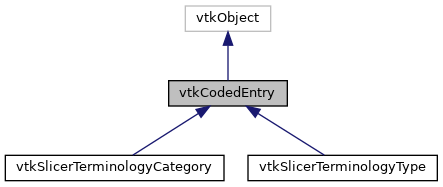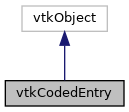Simple class for storing standard coded entries (coding scheme, value, meaning triplets)
More...
#include <Libs/MRML/Core/vtkCodedEntry.h>
Simple class for storing standard coded entries (coding scheme, value, meaning triplets)
vtkCodedEntry is a lightweight class that stores standard coded entries consisting of CodingSchemeDesignator + CodeValue + CodeMeaning triplets. This is a commonly used concept in DICOM, see chapter 3: Encoding of Coded Entry Data (http://dicom.nema.org/medical/dicom/current/output/chtml/part03/sect_8.3.html).
Definition at line 26 of file vtkCodedEntry.h.
◆ Superclass
◆ vtkCodedEntry() [1/2]
| vtkCodedEntry::vtkCodedEntry |
( |
| ) |
|
|
protected |
◆ ~vtkCodedEntry()
| vtkCodedEntry::~vtkCodedEntry |
( |
| ) |
|
|
overrideprotected |
◆ vtkCodedEntry() [2/2]
◆ Copy()
◆ GetAsPrintableString()
| std::string vtkCodedEntry::GetAsPrintableString |
( |
| ) |
|
Get content of the object as a single human-readable string. Example: ([hnsf'U], UCUM, "Hounsfield unit")
◆ GetAsString()
| std::string vtkCodedEntry::GetAsString |
( |
| ) |
|
Get content of the object as a single machine-readable string. Example: CodeValue:[hnsf'U]|CodingSchemeDesignator:UCUM|CodeMeaning:Hounsfield unit
◆ GetClassName()
| virtual const char* vtkCodedEntry::GetClassName |
( |
| ) |
|
|
virtual |
◆ GetCodeMeaning()
| virtual char* vtkCodedEntry::GetCodeMeaning |
( |
| ) |
|
|
virtual |
Code Meaning is text that has meaning to a human and conveys the meaning of the term defined by the combination of Code Value and Coding Scheme Designator. Though such a meaning can be "looked up" in the dictionary for the coding scheme, it is encoded for the convenience of applications that do not have access to such a dictionary.
◆ GetCodeValue()
| virtual char* vtkCodedEntry::GetCodeValue |
( |
| ) |
|
|
virtual |
Code Value (DICOM tag (0008,0100)) is an identifier that is unambiguous within the Coding Scheme denoted by Coding Scheme Designator and Coding Scheme Version.
◆ GetCodingSchemeDesignator()
| virtual char* vtkCodedEntry::GetCodingSchemeDesignator |
( |
| ) |
|
|
virtual |
Coding Scheme Designator identifies the coding scheme in which the code for a term is defined. Standard coding scheme designators used in DICOM information interchange are listed in PS3.16. Other coding scheme designators, for both private and public coding schemes, may be used, in accordance with PS3.16.
◆ Initialize()
| virtual void vtkCodedEntry::Initialize |
( |
| ) |
|
|
virtual |
◆ IsA()
| virtual int vtkCodedEntry::IsA |
( |
const char * |
type | ) |
|
|
virtual |
◆ IsTypeOf()
| static int vtkCodedEntry::IsTypeOf |
( |
const char * |
type | ) |
|
|
static |
◆ New()
◆ operator=()
◆ PrintSelf()
| void vtkCodedEntry::PrintSelf |
( |
ostream & |
os, |
|
|
vtkIndent |
indent |
|
) |
| |
|
override |
◆ SafeDownCast()
| static vtkCodedEntry* vtkCodedEntry::SafeDownCast |
( |
vtkObject * |
o | ) |
|
|
static |
◆ SetCodeMeaning()
| virtual void vtkCodedEntry::SetCodeMeaning |
( |
const char * |
| ) |
|
|
virtual |
◆ SetCodeValue()
| virtual void vtkCodedEntry::SetCodeValue |
( |
const char * |
| ) |
|
|
virtual |
◆ SetCodingSchemeDesignator()
| virtual void vtkCodedEntry::SetCodingSchemeDesignator |
( |
const char * |
| ) |
|
|
virtual |
◆ SetFromString()
| bool vtkCodedEntry::SetFromString |
( |
const std::string & |
content | ) |
|
Set content of the object from a single machine-readable string. Example input: CodeValue:[hnsf'U]|CodingSchemeDesignator:UCUM|CodeMeaning:Hounsfield unit
- Returns
- true on success
◆ SetValueSchemeMeaning()
| virtual void vtkCodedEntry::SetValueSchemeMeaning |
( |
const std::string & |
value, |
|
|
const std::string & |
scheme, |
|
|
const std::string & |
meaning |
|
) |
| |
|
virtual |
Convenience function for setting code value, coding scheme, and code meaning with a single method call.
◆ CodeMeaning
| char* vtkCodedEntry::CodeMeaning {nullptr} |
|
protected |
◆ CodeValue
| char* vtkCodedEntry::CodeValue {nullptr} |
|
protected |
◆ CodingSchemeDesignator
| char* vtkCodedEntry::CodingSchemeDesignator {nullptr} |
|
protected |
The documentation for this class was generated from the following file:


 1.8.14
1.8.14